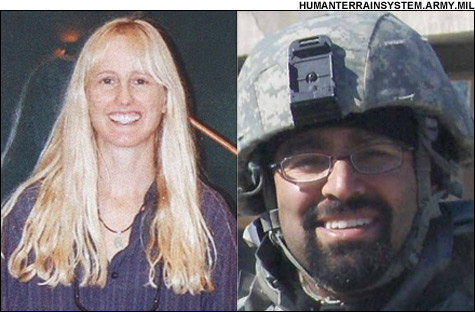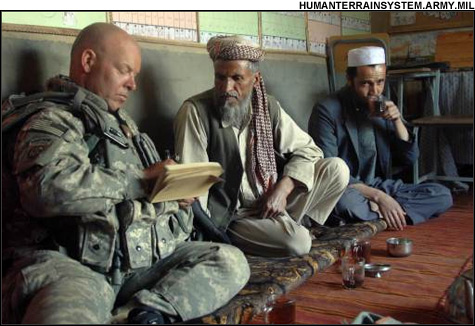
DEADLY DUTY: Paula Loyd (left) and Michael Bhatia — two anthropologists with Massachusetts roots — have been killed serving in the Army’s Human Terrain Teams program. |
On November 4, 2008, American anthropologist Paula Loyd was in Afghanistan's Kandahar province, discussing living costs with a local man named Abdul Salam, when suddenly he doused her with fuel from a jug he was carrying and set her on fire. The Wellesley graduate, who succumbed to her injuries on January 7, was neither a civilian nor a soldier, but a member of one of the US Army's controversial Human Terrain Teams (HTT).HTTs — which are currently deployed in Iraq and Afghanistan and are being planned for the Pentagon's African Command — are military units that embed anthropologists into war zones to collect intelligence, ostensibly to smooth the military's relations with the locals. While the Army's military objective is to take out enemies with bombs and bullets, HTTs are tasked with helping soldiers bridge cultural divides, and differentiate friend from foe, thus lowering American casualties.
The program is seemingly well intentioned, but critics have called it too small, disorganized, ill-prepared, and, most disturbingly, unethical. The HTT program has suffered withering criticism from many anthropologists, with the American Anthropological Association blasting the program as a "violation" of ethics and an "unacceptable application of anthropological expertise."
Things have gotten nasty, with each side becoming entrenched in its position — the military is rumored to have a "blacklist" of anthropologists hostile to the HTT program, while anthropologists have accused the military of spying on them.
No matter the criticisms, Loyd's murder is only one of several disasters that have plagued the program. Two other HTT anthropologists have been killed, including Michael Bhatia, a Medway, Massachusetts, native. An Iraqi HTT anthropologist is currently facingtrial in the US on charges of having spied for Saddam Hussein. An American was kicked out of the HTT program for joking that, if the US ever invaded Iran, she would "switch sides."
And then there's Don Ayala, an American contractor and former bodyguard of the Afghan president, who was a member of Loyd's HTT. After Salam set Loyd on fire, he ran toward Ayala, who knocked him down, pinned him to the ground, and flexicuffed him. Nearly 10 minutes later, when Ayala got word of the extent of Loyd's injuries, he shot Salam in the head, in full view of several US soldiers. In February, Ayala pleaded guilty to manslaughter for shooting Salam.
There have been staffing problems, as well. The program currently consists of only 19 teams in Iraq and six in Afghanistan, with just two trained anthropologists per team. And with 23,220 American soldiers in Afghanistan, but only six Human Terrain Teams, that amounts to one anthropologist for every 1935 American soldiers.
Lethal targeting
Both a recently leaked HTT manual and the program's founders claim that its members engage in "No Lethal Effects Targeting," but it would seem the US military adheres to that guideline in everything but practice. No restrictions are in place on the nature of the data gathered by HTT anthropologists and, once collected, the information is shared with soldiers, who are allowed to exercise "lethal targeting." So if an Afghan village leader confesses to an HTT operative that he sympathizes with the insurgents, the social scientist's fieldwork could end up justifying a midnight raid.
The HTT mission states that "the use of social science is necessary to and legitimate in military operations." Many anthropologists fear that such an attitude could lead to targeted killings, directed by data gathered by HTTs. Such fears are not assuaged by statements like the one made by Assistant Deputy Under Secretary of Defense John Wilcox, when he bluntly explained at a February 2007 "Precision Strike Winter Roundtable" meeting in Arlington, Virginia, that there is a "Need to 'map the human terrain' across the kill chain," which in turn "enables the entire kill chain." Translated into layman's terms, that means that HTT teams are needed to help US commanders better understand who their enemies are — and, thus, who to kill.

BAIT AND SWITCH? Official HTT policy cites “No Lethal Effects Targeting,” but critics wonder if information collected through the program is being used to target killings. |
Questionable success
So far, the HTT has generated plenty of controversy and press, but not a lot of concrete results for the military. Proponents throw around sunny statistics, such as that, in one Afghani province, HTTs helped reduce violence by 60 to 70 percent. But when David Price, an anthropology professor at St. Martin's University in Lacey, Washington, and a vocal critic of the program, filed a Freedom of Information Act request to substantiate that claim, he discovered that there was no study or official report to support those figures.